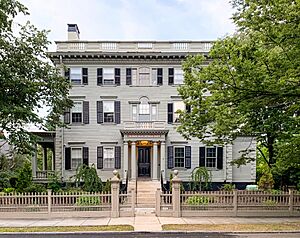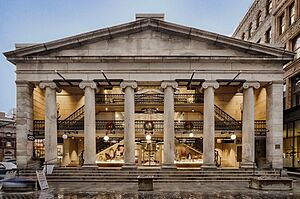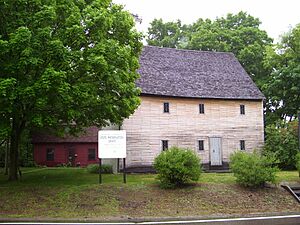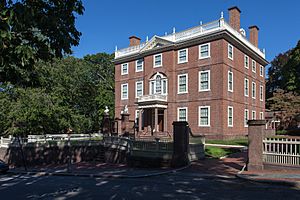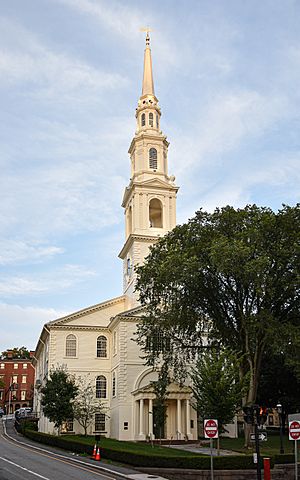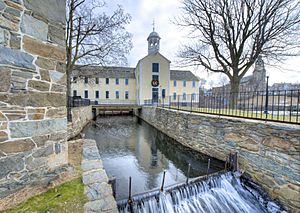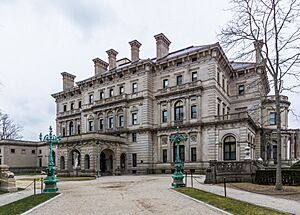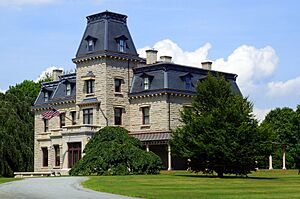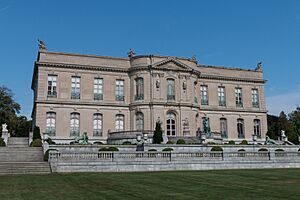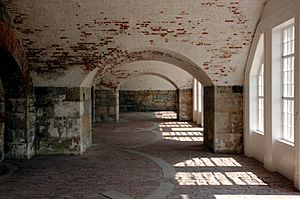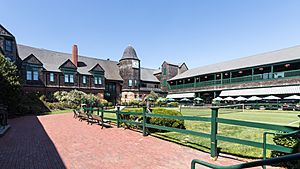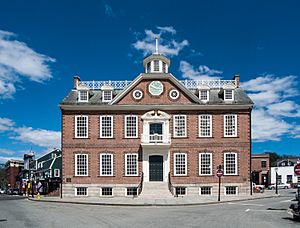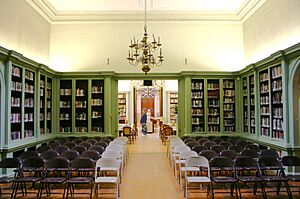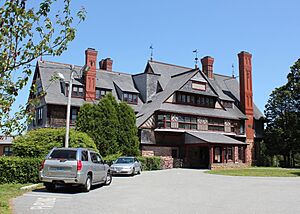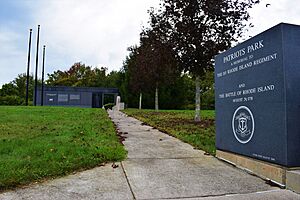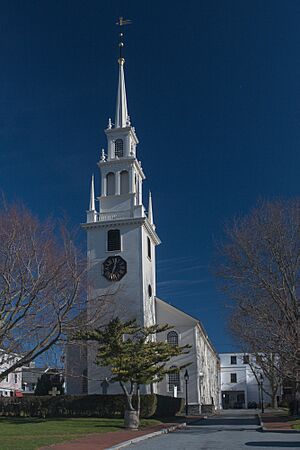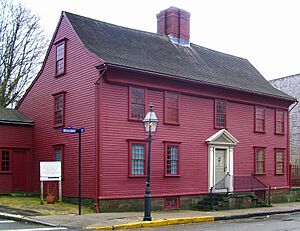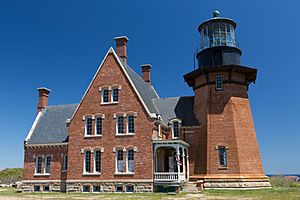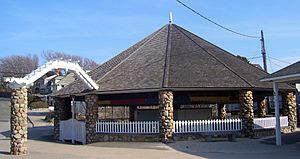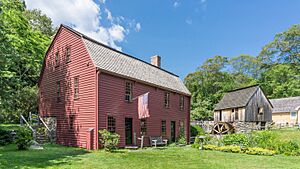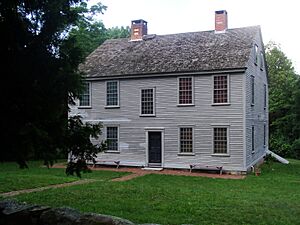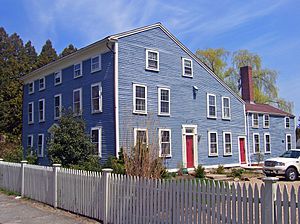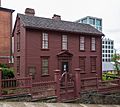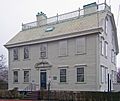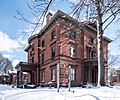List of National Historic Landmarks in Rhode Island facts for kids
Rhode Island is home to many amazing places that are super important to American history! These special spots are called National Historic Landmarks (NHLs). Think of them like VIPs (Very Important Places) that tell us stories about the past. There are 45 of these landmarks across Rhode Island's five counties. They include old houses, famous buildings, and even battle sites. Let's explore some of these cool places!
Contents
What Are National Historic Landmarks?
National Historic Landmarks are buildings, sites, or objects that have played a big role in the history of the United States. They are recognized by the National Park Service. When a place becomes an NHL, it means it's super special and needs to be protected so future generations can learn from it.
Explore Rhode Island's Historic Treasures
Providence County Landmarks
Nelson W. Aldrich House
This beautiful house in Providence was once the home of Nelson W. Aldrich, a powerful U.S. Senator around 1900. He was a very important person in Washington, D.C. Today, this historic home is used by the Rhode Island Historical Society, helping people learn about the state's past.
Westminster Arcade
Did you know the very first enclosed shopping mall in the United States is in Providence? It's called the Westminster Arcade and was built way back in 1828! Imagine shopping indoors almost 200 years ago.
Eleazer Arnold House
In Lincoln, you can find the Eleazer Arnold House. This house was built in 1691, making it one of the oldest homes around! It shows us what buildings looked like a very long time ago.
John Brown House
The John Brown House in Providence is a grand Georgian-style home. It was built in 1786 for John Brown, a wealthy merchant who also helped start Brown University. It's a great example of homes from that time.
First Baptist Church in America
The First Baptist Church in America, located in Providence, is super important because it's the oldest Baptist church in the country! It was founded by Roger Williams in 1638. The building you see today was built in 1775.
Old Slater Mill
In Pawtucket, you'll find the Old Slater Mill. This mill was the very first successful textile mill in the United States. It was a huge step forward for American industry and how goods were made.
Newport County Landmarks
Isaac Bell House
The Isaac Bell House in Newport is famous for being one of the first major "Shingle-style" houses. This architectural style uses wooden shingles on the outside, giving it a unique look.
The Breakers
One of the most famous mansions in Newport is The Breakers. It was built in the 1890s as a summer home for Cornelius Vanderbilt II, who was part of a very rich family. It's huge and looks like a palace!
Chateau-sur-Mer
Another amazing mansion in Newport is Chateau-sur-Mer. Built in 1852, this French-style villa was one of the first grand mansions in Newport during the late 1800s. It was built for a merchant named William Shepard Wetmore.
The Elms
The Elms is another incredible summer "cottage" (though it's more like a palace!) in Newport. It was built for Edward J. Berwind in a style called Classical Revival.
Fort Adams
Fort Adams in Newport has been a site for military defenses since 1799. Most of the buildings you see there today were built in the mid-1800s. This fort was super important for protecting Narragansett Bay.
Marble House
The Marble House in Newport was designed for William Kissam Vanderbilt. It was one of the first "Beaux Arts" style houses in the U.S. and helped start the trend of building huge mansions in Newport.
Newport Casino
The Newport Casino in Newport is an early example of "Shingle-style" architecture. It was also one of the first social clubs to have sports facilities. Today, it's home to the International Tennis Hall of Fame!
Old Colony House
The Old Colony House in Newport is a well-preserved public building from the colonial era. It was built in the Georgian style and served as the meeting place for colonial and state lawmakers until the 1900s.
Redwood Library
Founded in 1747, the Redwood Library in Newport is the oldest library in the country that still uses its original buildings. Imagine all the books and history inside!
William Watts Sherman House
This house in Newport was built in 1875 for banker William Watts Sherman. It's known as a very early example of the "Shingle style" of architecture.
Battle of Rhode Island Site
The Battle of Rhode Island Site in Portsmouth is where a big battle happened in 1778 during the American Revolutionary War. British forces successfully defended Aquidneck Island here.
Trinity Church
Trinity Church in Newport is the oldest church parish in Rhode Island. Its design from the early 1700s was inspired by Boston's famous Old North Church.
Wanton-Lyman-Hazard House
Built around 1697, the Wanton-Lyman-Hazard House in Newport is the oldest house in the city. It shows how architectural styles changed from the 1600s to the 1700s.
Washington County Landmarks
Block Island Southeast Light
The Block Island Southeast Light is a beautiful brick lighthouse built in 1874 in a style called Victorian Gothic. It stands tall on Block Island in New Shoreham, guiding ships safely.
Flying Horse Carousel
In Watch Hill, you can ride one of the oldest carousels still working in America! The Flying Horse Carousel dates back to 1876. Its horses hang from chains, which makes them swing as you go around, giving it its name.
Gilbert Stuart Birthplace
The Gilbert Stuart Birthplace in Saunderstown is where the famous portrait painter Gilbert Stuart was born. He painted many important people, including George Washington!
Kent County Landmarks
Gen. Nathanael Greene Homestead
This homestead in Coventry was the home of Nathanael Greene, a very important general during the American Revolutionary War. He was a key leader in helping America win its independence.
Bristol County Landmarks
Joseph Reynolds House
The Joseph Reynolds House in Bristol is the oldest known three-story wooden house in New England, built in 1700. During the American Revolutionary War, it was used as a headquarters by the French general Lafayette in 1778.
Images for kids
 | Mary Eliza Mahoney |
 | Susie King Taylor |
 | Ida Gray |
 | Eliza Ann Grier |


